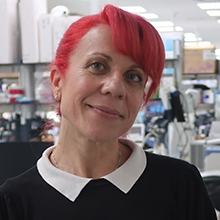Antimicrobial Resistance
We contribute to understanding the causes and risk factors for antimicrobial resistance, and to developing new drugs and vaccines.

Resistance to antimicrobial drugs poses a serious risk to the progress made in global health in the past decades.
Antibiotic resistance is an important global public health challenge and threatens our ability to treat infectious diseases. Resistance to first-line drugs also increases health care costs, since infections last longer (more days at the hospital) and become more expensive to treat.
Antimicrobial resistance is a natural process by which microorganisms (bacteria, viruses, parasites, fungi and other pathogens) develop resistance to the drugs used to fight them. The abuse and misuse of antibiotics and other antimicrobial drugs favours the development and spread of resistant microorganisms, and generates the need for alternative treatments that are effective against such pathogens. However, the number of new approved drugs is declining, with only three new antibiotics receiving approval in the last 30 years.

The growing number of drug-resistant bacteria poses an increasing threat to the effectiveness of existing antibiotics. Indeed, only 3 new antibiotics have received approval in the last 30 years
Jordi Vila, Director of the Antimicrobial Resistance Initiative
Antimicrobial resistance also concerns other, non-bacterial diseases. Resistance of the malaria parasite to the antimalarial drugs chloroquine and sulfadoxine-pyrethamine is widespread in most countries where malaria is endemic; in addition, the emergence of artemisinin-resistant P. falciparum parasites has been reported in South-East Asia. Resistance is also an increasing concern in the treatment of HIV infection due to the rapid increase in the availability of antiretroviral therapy in recent years.
Key facts
Fighting resistant pathogens requires responsible action and participation of all members of society. Importantly, we need to:
- strengthen current systems for tracking and monitoring antibiotic resistance
- ensure access to quality-assured essential drugs and promote the rational use of antibiotics in both humans and animals
- improve the prevention and control of infections
- promote research, innovation and development of new tolos (antibiotics, vaccines, etc.)
ISGlobal's Antimicrobial Resistance Initiative is designed to help to fight the growing emergence and spread of pathogens resistant to antimicrobial drugs from a multidisciplinary approach through the institute's core activities: research, training, technical assistance and analysis.
Highlighted Projects of the Initiative:
International Research Partnership for prioritising antimicrobial resistance: The Wellcome Trust-funded project seeks to establish an interdisciplinary network to strengthen antimicrobial resistance research that crosses biomedical and social science as well as geographic barriers. The project, coordinated by the Centre of Global Health of the University of Sussex, also involves the Barcelona Institute for Global Health (ISGlobal) and the Institute of Medical Microbiology, Immunology and Hygiene (IMMH) at the University of Cologne.

Our Team
Initiative Director
-
 Jordi Vila Estapé Research Professor and Director of the Antimicrobial Resistance Initiative
Jordi Vila Estapé Research Professor and Director of the Antimicrobial Resistance Initiative
Initiative Coordinator
-
 Elisabet Guiral Programme and Project Manager & Coordinator of the Antimicrobial Resistance Initiative
Elisabet Guiral Programme and Project Manager & Coordinator of the Antimicrobial Resistance Initiative
Our Team
-
 Victoria Ballen Postdoctoral Fellow
Victoria Ballen Postdoctoral Fellow -
 Marta Marí Predoctoral Fellow
Marta Marí Predoctoral Fellow -

-
 Ignasi Roca Associated Researcher
Ignasi Roca Associated Researcher -
 Sara Soto González Associate Research Professor and Head of the Viral and Bacterial Infections Programme at ISGlobal.
Sara Soto González Associate Research Professor and Head of the Viral and Bacterial Infections Programme at ISGlobal. -
 Marina Tarrús Scientific outreach officer for the RAM Initiative
Marina Tarrús Scientific outreach officer for the RAM Initiative



